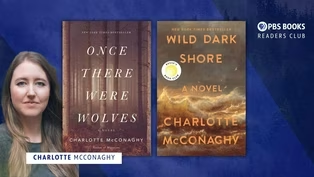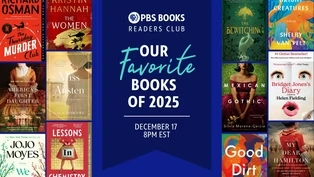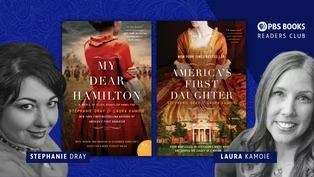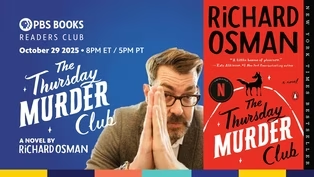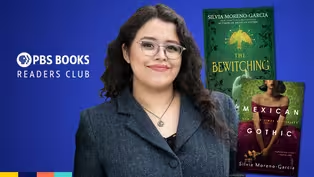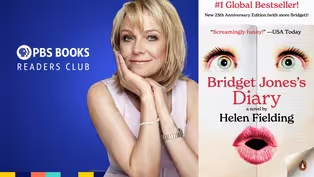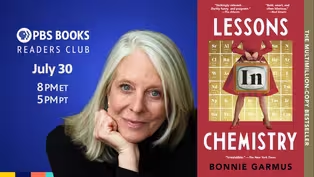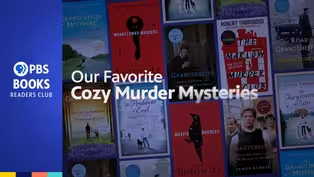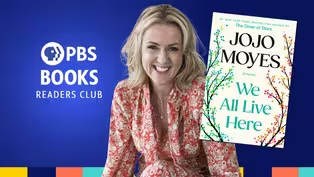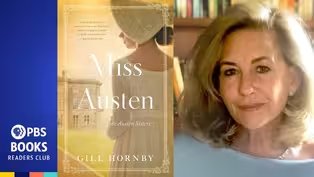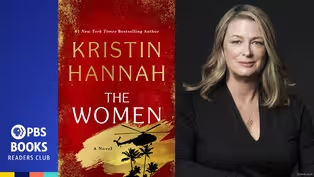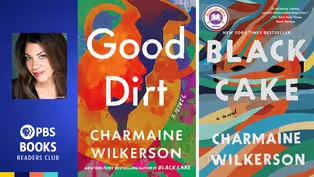
Readers Club | Our Favorite Books of the Year
Season 2024 Episode 40 | 51m 53sVideo has Closed Captions
PBS Books Readers Club | Our Favorite Books of the Year
Join hosts Lauren, Fred, Princess and Heather as they reminisce the exciting first season of the PBS Books Readers Club! They'll highlight the most incredible author moments and fascinating reads from the series this year that were heartfelt, funny, and inspiring! Plus, hosts dish out their favorite book picks for 2024 — providing readers with an ultimate gift guide for the holiday season!
Problems playing video? | Closed Captioning Feedback
Problems playing video? | Closed Captioning Feedback

Readers Club | Our Favorite Books of the Year
Season 2024 Episode 40 | 51m 53sVideo has Closed Captions
Join hosts Lauren, Fred, Princess and Heather as they reminisce the exciting first season of the PBS Books Readers Club! They'll highlight the most incredible author moments and fascinating reads from the series this year that were heartfelt, funny, and inspiring! Plus, hosts dish out their favorite book picks for 2024 — providing readers with an ultimate gift guide for the holiday season!
Problems playing video? | Closed Captioning Feedback
How to Watch PBS Books
PBS Books is available to stream on pbs.org and the free PBS App, available on iPhone, Apple TV, Android TV, Android smartphones, Amazon Fire TV, Amazon Fire Tablet, Roku, Samsung Smart TV, and Vizio.
Providing Support for PBS.org
Learn Moreabout PBS online sponsorshipMore from This Collection
The PBS Books Readers Club is a monthly digital-first series that brings its members into conversations behind the stories of your favorite books & shows. You can watch the online on the PBS App, with extended interviews available for PBS members on PBS Passport.
Readers Club | Ep 301: Charlotte McConaghy | Once There Were Wolves
Video has Closed Captions
PBS Books Readers Club hosts author Charlotte McConaghy to discuss her novel Once There Were Wolves. (58m 55s)
Readers Club | Ep. 212: Our Favorite Books of 2025
Video has Closed Captions
PBS Books Readers Club celebrates the wrap of its second season with a highlight of 2025 (47m 55s)
Readers Club | Ep. 211: America's First Daughter | Stephanie Dray & Laura Kamoie
Video has Closed Captions
PBS Books Readers Club welcomes co-authors Stephanie Dray and Laura Kamoie (1h 1m 45s)
Wed Oct 29 2025 | Readers Club | Ep. 210: Richard Osman | Thursday Murder Club
Video has Closed Captions
PBS Books Readers Club welcomes celebrity writer Richard Osman to discuss his best-selling novel (52m 44s)
Readers Club | Ep. 209: Silvia Moreno-Garcia | The Bewitching and Mexican Gothic
Video has Closed Captions
PBS Books Readers Club welcomes award winning author Silvia Moreno-Garcia to discuss her new book. (52m 42s)
Readers Club | Ep. 208: Helen Fielding | Bridget Jones's Diary
Video has Closed Captions
PBS Books Readers Club welcomes beloved British author Helen Fielding to discuss her iconic novel (59m 30s)
Readers Club | Ep. 207: Lessons in Chemistry | Bonnie Garmus
Video has Closed Captions
PBS Books Readers Club welcomes international best-selling author Bonnie Garmus to discuss her novel (49m 3s)
Readers Club | Ep. 206: Our Favorite Cozy Murder Mysteries
Video has Closed Captions
PBS Books Readers Club hosts a special event sharing Our Favorite Cozy Murder Mysteries (52m 32s)
Readers Club | Ep. 205: We All Live Here | Jojo Moyes
Video has Closed Captions
PBS Books Readers Club welcomes international & New York Times best-selling author Jojo Moyes (57m 37s)
Readers Club | Ep. 204: Miss Austen | Gill Hornby
Video has Closed Captions
PBS Books Readers Club welcomes international best-selling author Gill Hornby to discuss her novel (51m 18s)
Readers Club | Ep. 203: The Women by Kristin Hannah
Video has Closed Captions
PBS Books Readers Club welcomes international best-selling author, Kristin Hannah to discuss novel. (53m 29s)
PBS Books Readers Club | Ep. 202: Good Dirt & Black Cake | Charmaine Wilkerson
Video has Closed Captions
PBS Books Readers Club is delighted to welcome critically acclaimed author Charmaine Wilkerson (55m 29s)
Providing Support for PBS.org
Learn Moreabout PBS online sponsorship(exciting music) - We all love to give and get books.
I'm sure you do too.
So we've put together a list of our favorite books of the year to make it easy, and we invite you to share your best of list in the comments too.
Your favorite book of 2024 might just be the one that makes another book clubbers' year in 2025.
(exciting music continues) - Well, hi and welcome to the PBS Books Readers Club.
- What an amazing year of reading it's been.
In this special episode, we'll highlight some of the incredible moments we've had with authors and share our favorite books of the year.
It's the ultimate gifting guide for readers.
- Hi, I'm Fred Nahhat here with Lauren Smith, Princess Weeks, award-winning video essayist and author who brings her master's degree in literary theory to our table, and of course Heather-Marie Montilla, our resident librarian and PBS Books national director.
But, of course, you are the most important person in this book club.
We invite you to share your thoughts with us and the other book clubbers in the comments.
What was your favorite book that you read this year?
How many did you read?
Which author interview was your favorite?
We really wanna know, truly.
We love reading and responding to your comments in the chat.
- Well, speaking of enjoying time in the company of other readers, be sure to join the PBS Books Readers Club Facebook group.
You'll find and share book recommendations and discuss your favorite reads anytime.
- And please share this event.
As we always say, friends, do not let friends miss out on great books.
So book friends, it's been a really special year of reading.
I have loved every second.
- Yeah, when I signed on for this, I was so excited 'cause I love reading, but it has honestly been so fulfilling to get to talk to all of you.
I mean, like the authors are great, we love them, but, honestly, getting to bond with you guys, hearing your thoughts, like, that to me was the best part of this.
- I agree.
I mean, you guys know I read lots of books to interview authors for PBS Books, but being able to read alongside you and then also reading and hearing what our viewers think.
Both was so fulfilling.
I loved it.
- Yeah.
- Well to me, again, the diversity of thought around this table, the diversity of thought that our readers share with us, there could be no better group that comes together.
We're all also different.
We're from different parts of the country.
We are of different generations, of different perspectives.
And so the appreciation of all of that makes each one of the books that much more fulfilling and enlightening, at least to me.
- Well, I think that's a good point because a lot of times when you form a book club, you form it with your friends and your peers, right?
You don't often have people that are different from you in your book club.
And so we have each other, but we also have everybody at home offering their perspectives.
And it's my favorite time of every single month when we do our live, Facebook Live episode, and the hearts just start flowing across the screen and people are sharing their comments and it makes my heart swell.
I love it so much.
- Yeah, they get so connected.
And a lot of times they echo the thoughts that we had.
And then a lot of times it's wow, blowing me away with things that I never considered.
Again, that diversity of thought, that diversity of geography, that diversity of where one is when the book hits them in their life or their experience.
- Yeah, I totally agree.
And you are what makes this all so special so thank you for being with us.
- Well, coming up, we're gonna share our Best of the Year, book recommendations, and we want to get you connected with all the great author talks coming up next year.
- [Lauren] Like any good book club, it's more fun when we all get involved.
There are many ways to connect with us, including our e-newsletter.
You'll find exclusive author interviews, book recommendations, and more.
Visit pbsbooks.org/subscribe.
- [Fred] Yeah, and be sure to follow PBS Books on Facebook and Instagram, and fill up your feed with great books and authors.
- And if you really love this PBS Book club, I hope you'll take a moment to show your support because PBS stations rely on donations from folks like you and me.
And if you'd like to see more of the PBS Books Readers Club, here's a great way to help us keep it going.
If you're watching on Facebook or YouTube, just click the link in the comments or description or visit pbsbooks.org/donate.
- You will be taken to your local PBS station's giving webpage where you can find some PBS Books swag as our thanks for supporting this program.
One of those gifts is our official PBS Books mugs.
Just $5 a month will get you the PBS Books mug and it makes you a member of your local PBS station giving you access to all the amazing shows in Passport, including the extended editions of our PBS Books Readers Club episodes, full seasons of "Masterpiece" drama, and so, so much more.
- If you wanna see more of the PBS Books Readers Club, we gotta hear from you.
Just click that link in the description or visit pbsbooks.org/donate.
We'll send you a set of the official PBS Books stickers too along with your mug.
My weekend is booked.
That is very true.
Almost all of the time for us.
Again, donation support your local PBS station and it helps us keep this book club going for another year.
- Well, in looking over the last year, one of the things that I discovered, and I just really enjoyed, is that the authors we met are people just like us.
What separates them from us, I think, is process.
And we were able to get into what is their process.
And each one of them had a different way to go about writing these books that, you know, have reached and touched all of us.
But the process to me, so fascinating.
- So interesting.
What did you think?
- I thought everyone who had like a very stringent routine, I was very impressed by.
Like, people who are like getting up early, and a lot of 'em are morning people, like a lot of morning writers.
And I, as a night owl, I'm like... - Right?
Allison Pataki is one.
She's like, "I sit down, I've got my coffee, I've got my music, I'm in my office, like seven o'clock every day, here I go," yeah.
- Classical music.
- Yes, that's so inspirational.
And I felt like with Julia Alvarez, which is about like getting through with that prayer, that mantra at the beginning, - Yeah, her ritual.
- Her ritual, creative ritual.
- I thought that was just so impactful.
And, like, I think about that every time I sit down at my desk, 'cause like what helps center me as I get ready to do whatever I'm doing.
- Yeah.
- I loved how Percival Everett talked about that his process is 90% research and 10% thinking and then all writing.
For me, that was so interesting to think about, just the immense amount of research that he does.
And that was echoed really across the board.
If we think about Allison Pataki.
- Yeah, for sure.
- Right?
She said for three, at least two years, right, she just dug in reading everything she could find about Margaret Fuller.
And then she didn't start writing until that voice spoke to her.
- And she visited all the places that she was, put herself in the environment.
- Very, very cool.
Percival Everett, the thing that he, I guess showed me is it's an athletic pursuit.
You just gotta write, get in a room and write.
And the other one, which you could probably relate to, is Tana French says she's a night person.
She likes to, you know, stay up late, but she has kids.
- Right.
- She had to call in Audible- - Geraldine Brooks too also had that same story.
- Yeah, and change the routine.
And so process is process, but then life gets in the way so they were able to tackle that too.
- The other thing I loved about Tana is that she doesn't know the end- - Right.
- When she starts.
- I thought that was so good, yeah.
- So crazy to me, and Percival Everett said he did his best writing while he was fishing.
- [Heather-Marie] Yes!
- I loved that.
I loved that.
- Him saying he read, like he kept rereading like "Huckleberry Finn" like 30 plus times, I was like, I can't imagine reading that book over and over again.
But like you said, athleticism of like using your brain and really investing in the work, it's just like, I was like, whoa.
- But it kinda goes to show there's no wrong or right way to be a writer.
Everyone had their own style, their own process.
And it was so interesting to hear about all of the different ways that they go about creating the amazing work that they do.
- Well, speaking of process, here's the highlights of our favorite authors talking about their process on the PBS Books Readers Club.
- I am a creature of my rituals.
It used to be that I loved late at night because it was so quiet, everybody had gone on to their sleep or whatever.
But I can't keep that up as I grow older.
I like early, early morning.
You know, before the mind clutters with other things.
And I love the solitude, cup of coffee.
And I don't like to read emails or get involved with anything until I'm done, because then those things get in my head instead of my characters.
I have friends that go to the coffee shop to write, are you kidding?
I know, these stories are walking around.
And I wanna hear them.
I would be distracted.
I could not do it that way.
So I don't really mix it up.
I need that solitude and that quiet.
- My brain is pretty worthless after three p.m. Eastern.
Get up, get the coffee goin'.
While the coffee's pumpin' through the veins, sit down and be productive, that's my way.
I like to work at home, in my office, because I like to control the music.
I like to control the playlist.
I like classical music where there are no lyrics.
'Cause if there are lyrics, I get distracted.
I like to have easy access to tea refills, water refills, coffee.
I like to control the temperature if my feet are getting cold from sitting still too long.
- Same.
- So coffee shops for all those reasons don't really work for me if I'm doing the deep creative thinking.
If it's something a little lighter, then I can have that outside noise and distraction.
But usually morning, classical music on, cup of coffee or hot tea, otherwise quiet and in the zone.
- As far as my work process, I just trust myself that I'm working.
90% of what I do is research and the other 10% is thinking.
Writing fiction is labor intensive.
There's only one way to end up with 500 pages or something, and that's to write it one word at a time.
And that's a lot of scribbling.
I work long hand.
- Wow.
- Well, it's because I can't type.
And then I type it up, which takes a while, but it also gives me a chance to edit as I'm writing.
- Before I had kids, I was a night owl.
That's what I like.
I like getting up at about 10 o'clock and then staying up until two, three a.m. writing and then going to bed.
My brain doesn't even work properly until about after 10 p.m. - Yeah, that sounds like somebody else I know.
- For sure.
(hosts and guest laughing) - Unfortunately, then I had babies and they had other ideas and they did not think I should be allowed to sleep 'till 10 in the morning.
And now I've got school age kids.
So, you know, I'm up for the school run.
So now my writing hours are between when I get them to school to when they come back in the door.
- You have to treat it like a job.
I don't believe in writer's block because auto mechanics aren't allowed to have auto mechanics block and hairdressers don't have hairdresser's block.
(hosts laugh) You go to work every day.
And you can't do well every day.
You can't, you know, make beautiful writing every day, but you can do something.
And if you've got something, you've got something to work with.
And that was inspired by a friend who's a great sculptor called Sarah Sze.
And she was asked about her process, and she said her process is mess, mess, mess, art.
- Perfect.
- And I just find that such a liberating thought because you can't make art every day, but you can absolutely make a mess every day.
So go to work.
- I'm also always curious about our author's inspiration for writing, whether they wanted to be an author when they grew up or they sort of stumbled on it later in life.
Everyone had sort of a different origin story.
- Yeah, Julia Alvarez's story about her tia, like helping her love reading really struck- - She didn't like books.
- Yeah, exactly.
And I think that we hear so many times of people who, like, loved it automatically.
I love, like, how your family and the people around you help build you up.
And it's not always just your mom or your dad, it's your aunt and your cousin.
And I just think that, I just loved, and then she had her picture with her.
- Yeah, that was so sweet.
- And I thought that was just one of my favorite moments.
So I love that origin story personally.
- Well, and she also came to it as a storyteller, which is also interesting.
And I think we see that in all of our authors, this real ability and want to tell a story.
If you think of Tana French, right, her ability to really talk about it's a Western trope, I had never thought of that at all.
But that was her inspiration.
It was really interesting because I went back, and I thought, oh my gosh, this is so different to think about it in this way.
- Yeah, and everyone had sort of a different reason for writing too.
I remember Scott Alexander Howard, his first novel was one that we covered on the Readers Club and it was "The Other Valley."
And him telling his story about, like, he had a friend that passed away and it sort of sparked this idea in his head for the novel and also allowed him to put so much heart into that book.
I thought that was really interesting.
And he wasn't always an author, right?
He was like a professor of- - [Princess] Yeah.
- Like psychology.
- Yeah, super doctorate guy.
- Interesting to see how that plays into his novel, his backstory.
- Well, he also had a friend that kept bugging him.
He wanted to, like, read part of the book and Scott kept putting him off, putting him off, putting him off.
And finally he relented.
And the other thing to me was Geraldine Brooks.
Her real-life experience with horses- - [Princess] Yeah.
- And she delved into a topic with that horse that was just multi-generational, and so, so amazing how she was able to take a spark from her real life.
And the end result in the horse was just fascinating to me.
- I love that story she told too, I think we asked her like, "Do you love horses?"
She's like, "Oh, well, like I took it up when I was 50.
I just thought it would be fun.
I had no idea what I was getting into."
- Exactly.
- I love that so much.
- Never too late.
- Never too late.
- Well, and she was a journalist, right?
- Yeah, yeah, thorough and good, yeah, mm-hmm.
- Yeah, and so to think about that career path and then to be writing historic fiction or mystery and how they also come to their craft as an author of a fiction with that journalistic perspective, which also brings a richness to their writing.
- She got a little glint in her eyes.
She said, it's a lot like journalism, but just a little bit more fun.
- Yeah, yeah.
- For sure.
- Little facts.
- Exactly.
- Well, let's take a look, shall we?
A year's worth of inspiration from our PBS Books authors.
- But I have one auntie who read books and she was considered a jamona, an old maid, because she was all of 24 and not married.
And mamita, my grandmother would say, "It's because your nose is always in a book.
What man wants (audio warps)," basically is what she was saying.
And that tia gave me a copy of "One Thousand and One Nights."
And I loved, I was, I lied when I said books were all boring to me.
That book was beloved.
Beloved.
It was the first time, here was a girl with brown skin.
She wasn't like a princess or something.
She could've been a Dominican.
And she was brave and bold and she learned all the stories there were to tell and she saved her life by storytelling.
I thought, "Wow, I didn't know stories had that kind of power."
It put a little seed in the bloodstream of my imagination, which I carried with me when I came with this idea that stories have power and that a girl could tell them and free herself and all the other women in the kingdom.
Wow, that's powerful.
- [Lauren] I love your tia for sharing that book with you.
- She's still alive, my tia.
And you know what, of all the, I don't have a lot of pictures here, but of all the people in my, she's still alive.
She's about 94, my tia.
- [Hosts] Aw.
- [Princess] Yeah.
- [Lauren] She's beautiful.
We love her.
- Yeah, yep.
So she knows that she's responsible.
(hosts and guest laughing) - 10 years ago, I had a good friend who passed away.
She was in hospice.
And a few days before she died, I had this sudden image of these towns that just repeated over and over again all staggered in time at these precise intervals.
And I kinda just thought, "That's a cool idea.
I should do something with that someday, or maybe somebody else should," and didn't really think about it for a long time.
But the reason that grief has always been the main impetus for time travel in this story kind of stems from that personal context.
You know, I was in a situation where I was trying to help coordinate whether, you know, all of her friends could see her again.
You know, because things were moving more quickly than we'd expected them to.
And most of us didn't end up getting to say goodbye to her in the way that we would've liked.
And we had to sort of reconcile ourselves to the fact that the last time we saw her, this kind of incidental, you know, just hi goodbyes was the last time.
And so I think that this world being structured around people kind of getting to see a final, you know, have a final vision of a loved one and say a final goodbye even at a distance, I think, you know, that's the reason why.
- I have to say it began for me with the rather rash decision to take up horse riding in my 50s- - (laughs) Wow!
- Having never been (audio warps) - But I was at actually, it was a conference for writers in Santa Fe and it was on a ranch and one of the wranglers persuaded me that they were great horses and nothing terrible would happen to me if I went on a trail ride, and I believed him.
And I had an ecstatic experience doing it.
And then I was lucky enough to go to a lunch at Plymouth Patuxet Museum.
And at the same lunch, way down the table, a gentleman from the Smithsonian was telling his lunchmates how he had just delivered the skeleton of the greatest racehorse in the American 19th century from a forgotten place in the attic at the Natural History Museum in Washington to a private place in the International Museum of the Horse in Kentucky, because this horse was the reason that Kentucky became the center of thoroughbred breeding in America.
And my salad was uneaten and my lunch.
(hosts laughing) But (indistinct) of my attention, because I knew right away that this was going to be my next novel.
- Now one takeaway that stuck with me from reading Leonardo da Vinci from Walter Isaacson was the importance of collaboration and how great works are never really accomplished alone.
I always like to take the opportunity to ask the authors about the advice they've received that's made a difference in their lives and what they would share with aspiring writers.
- Yeah, they've had some really good answers too.
I always like their answer to that question.
- Yeah, like I was really, as someone who really struggles to, like, sit down and, like, figure out how I wanna write, when Geraldine Brooks just said like, "You can't rely on the muse to strike, you just have to do it," like it's very, you know, forward, but I just think, like, it's true, sometimes you just have to go after what you want.
And so, like, I definitely have taken that advice to heart.
And you said that there was similar advice you heard from Henry Louis Gates, Jr.?
- Yes, he certainly said, you know, if you write one page every day, that at the end of the year you will have written 365 pages.
And I think for someone, I'm not a writer, but then if you even think of what Julia Alvarez said, right, she said, "When my reading is bad, my writing is bad too."
And so her advice was read, read, read and to find a community of readers.
And that's what we've found here.
Not only here, but out there too with all of you.
- Yeah, I liked chatting with Olivia Ford too because she was somebody that wasn't always a novelist.
She was a TV producer, she worked in reality TV, and then she entered a contest, right?
And her advice was like to just go for it and to not be too hard on yourself.
She's like, "There are sometimes those darker days that aren't great, but to appreciate the process of writing," I thought that was really good advice too.
- Well, to me, I think Allison Pataki was an example of this.
And also maybe she didn't say it, but sayings are there for a reason, which is write what you know.
And she loves history so much, and her whole experience, she was a real fan of history.
Write what you know and, you know, that's just something that's maybe a stereotype, but so, so true.
- Well then, and Julia Alvarez would say like, "Don't write what you know because then how will you discover different things."
So they have conflicting ideas on that, but it depends on the writer.
There's a different process for everyone.
- That's why they make wallpaper.
(hosts laughing) All right, when it comes to advice both given and taken from authors, here's some highlights of this year on the PBS Books Readers Club.
- If you pursue curiosity for its own sake, well, you're not just being curious about something 'cause it may lead to, you know, something that'd be useful for you.
Curiosity for its own sake sometimes becomes its own reward and good things come from it.
I guess one more piece of advice I give is that everybody I've written about, it turned out to be not just about their passion, but about connecting their passion to something larger than themselves.
Whether it's Elon Musk trying to get to Mars or Leonardo da Vinci, you know, trying to connect science in the humanities and square the circle and make the perfect smile or Einstein trying to unite all the forces in the universe, they all felt like they were driven by a mission, not simply driven by making money.
- If you write a page a day, in the end of the year you've written 365 pages.
You know, think about anybody could write a page.
Three paragraphs, double space.
You can do it.
So that when you have a writer's block, regularity is very important, a routine, so that you're just in the flow.
And I tell my students, you have to have a first draft before you can have a second draft.
So write down anything just to keep it coming out, notes to yourself.
Then you go back and you polish it and then you do a final draft.
That's crucial.
- Great books are made in the edit.
'Cause I think sometimes we read our favorite books and we think I will never be able to write anything like that.
And that's because we're seeing the book after it's been through loads of different people and edited and you're seeing kind of polished end product when really if you saw the first draft, it might feel a bit more achievable.
So I think the best advice was told that because actually it made me be less self-critical and just get those words down because truly it's just like getting the words down and then you can shape it and make it really good rather than worrying about every sentence being perfect.
The happiest I've been on this journey was on the good writing days.
That even was better than the feeling of seeing the cover for the first time.
Like truly it was the good writing day.
So a bit like life, enjoy the journey and don't just focus on the destination.
- A lot of inspiration to take away from these authors.
That's for sure.
And we've had some fun along the way too.
- Definitely.
I think my favorite part during the interviews is like when the elements come into play.
And like there was a fun moment with Geraldine Brooks, our first interview, where like her birds were just- - [Lauren] Like Australian birds, crazy birds.
- Just howling at her.
And then Rachel Khong just like at the hotel just trying so hard to be there for us.
Like, I just think like life is hard and interviews are hard when you're not in person.
I think all those little moments of just like humanity and connection despite all of that were just so fun.
- They're real people- - Exactly, exactly.
Their Wi-Fi fails too.
- For sure.
- Well, proving that the PBS Books Readers Club pauses for no person, Scott Alexander Howard getting a FedEx delivered- - He's like, "I gotta get up.
I need this package."
- Yeah, in the middle of the interview.
Love that.
That's just a slice of life.
- I also loved, Percival Everett was just funny in general.
It comes through in his writing, but he was such like a dry humor, funny guy.
- [Heather-Marie] Yes.
- I remember us being nervous to talk to him because he's so esteemed and a professor.
We were all trying to be on our best behavior.
And then he told this story, we're like, "So how did you come up with James," thinking it would be this like big thing, that he's been thinking about forever.
And he's like, "Well, I was playing tennis and like I hit a wild shot and it just, like, came to me.
I'm like, okay, I gotta play more tennis.
- Yeah, exactly.
- You're right.
- Well, and I really thought it was funny when we were speaking to Robert Thorogood and we asked him about, you know, his inspirations and, you know, he not only said Agatha Christie, but what was so funny is he said how much he hated Sherlock Holmes.
- [Princess] Yes.
- And went on and on about it.
And for me, it was just so funny to think about like you have two shops, you have Agatha Christie and you have Sherlock Holmes and never shall those meet.
- Yeah, no which would sting for those two.
- No, no.
(hosts laugh) - There were so many great moments.
Here are a few of our favorites.
Because Agatha Christie was at the forefront of this.
I mean, there are two types of murder mystery readers, I sort of think.
There are the ones who are obsessed with Sherlock Holmes and the ones who are obsessed with Agatha Christie.
I'm not interested in Sherlock Holmes.
I find him boorish and irritating, and I don't like him at all.
And the mysteries aren't that good.
There we are, and so I've taken- - That's a soundbite for this entire interview.
- I think Arthur Conan Doyle will survive my opinion.
That's just a personal preference.
- Which has had a thriving Black community for, you are hearing our wonderful Australian cockatoos.
- [Princess] I love it.
Yeah, big and small.
- Big, big animal episode.
And, you know, we had these kind of heavily guarded borders between the past and the future in the novel.
Oop, sorry.
Sorry, I'm gonna have to start that again because I'm getting a stupid phone call that interrupted my stream, okay.
- If it's your mom, you'll have to answer.
- That's what we've provided on this set.
- I think it's FedEx.
(hosts laughing) - Rachel Khong, thank you so much for joining the PBS Books Readers Club.
It's been so wonderful to talk to you.
- Thank you so much for having me.
Thank you for putting up with this very public space that I'm in- - It's the true life of a writer.
- Exactly.
- For sure.
- I mean, that's the full experience.
- Very much on the road right now.
Yeah, lots of different beds, lots of different meals.
And yeah, just getting from place to place.
But I hope to meet some readers on the road and I think that would be it.
Yeah, it's just part of the honor and privilege.
- Well, I wish I could tell you that I had a burning desire for many years to write this, but I didn't.
(hosts chuckle) About three years ago, I was playing tennis and I made a really poor shot.
And as I watched the ball sail away, I thought to myself, "I wonder if anyone has ever written this from the point of view of Jim."
And also explained to me why I'd hit the ball so poorly.
(hosts laugh) - I wish I had thoughts like that when I was playing tennis.
- Yes, of course.
(laughs) - So I went home and I couldn't find an example of the story of "Huckleberry Finn" through Jim's eyes so I just decided to do it and it happened.
-I like to think I am a pretty positive person.
but weridly, a lot of mystery writers I know are kind of upbea and sociable and cheerful.
And I figure its because, if anything dark ever pops into my head Ive got an outlet for it.
Ive got somewhere to put it.
It just doesnt hang around there bouncing around, I can write it down.
and with any luck, I even get paid for it!
“laughter” - So much fun.
Y'all managed to bring out the best, best in our authors.
And these authors, they've been great.
And they've really opened up and shared some pretty personal and vulnerable stories, don't you think?
- Yeah, they really have.
They really have.
- I was so impressed with like, so Geraldine Brooks was our first interview.
And she was so vulnerable about her own grieving process with her husband who had just recently passed away and finishing the book in part for him because they had started working on stuff together and I believe she wrote a memoir about her grieving process, and I just thought like we're strangers and yet she was so willing to share that with us, you know?
And even like the loss of her horse, about how that's what inspired her, and she did later in life and just dealing with those dual griefs and still laughing and having fun.
I think, like, as we're all getting older, it's just a reminder that, like, there is still joy to be found even in, like, the saddest moments.
- Yeah, Olivia Ford was one too.
I thought she was so sweet, how close she was with her grandparents and she sort of based the characters in her novel.
But like Bernard.
Oh, like the perfect like older man, husband.
Like he was so cute.
- The ideal man.
- The ideal man, to know that like... (hosts laughing) The sweet relationship- - Not including you.
- Don't forget about Emerson.
Emerson will be piqued if he hears about this.
(hosts laughing) - Oh, but I love Bernard.
And to hear like how it's based off of her grandparents and their relationship was so special.
And also those memories of like food and the baking and how important it is in family traditions, that one had a lot of special moments.
- Yeah, it really did for me as well.
Picking up on that, you know, I thought it was a fantastic beach read, Olivia Ford.
And then I think it was probably her grandmother, more my mother, but how we connected over women who would put their lipstick on to answer the telephone.
- Yeah.
- And we really were like on the same page as that and I felt real warm about that.
- Yeah, yeah.
- It was nice.
- Well, and for me Julia Alvarez, everything she talked about in regard to her reading, because she made it so important to read but then she shared that her eyes are really going and so she is reading more on book readers but she always wants the actual copy of a book.
- Yeah.
- She also shared that she thinks or thought many times would be her last book.
And that, to me, as someone who has read her work and, you know, especially for Dominicans, just would be a huge loss, but all Americans.
I also thought that she shared with us that she actually buried the manuscript of "In the Time with Butterflies," which is kind of like what happened in... - [Lauren] "The Cemetery of Untold Stories."
- Exactly, right?
So how crazy to think about that all the years back it was like the seed that has blossomed into what it is now.
- Yeah, and Rachel Khong shared some really special memories too, just talking about how her book "Real Americans" had some, like some of those feelings that she's had of like not ever feeling in the right place.
Like she never feels at home no matter where she is.
And like you said, Princess, like we haven't talked to these authors before.
It's not like we've been like, you know, hanging out with them, I wish we could, but they're so giving and they've been so warm and we've loved every single minute with them.
- Well, what good is a book if it's not pulling at the heartstrings?
Here are some top heartfelt moments from the last year.
- Jenny and Bernard were largely inspired by my own grandparents.
I'm super close to them.
They live in our house, in my parents' house.
So we all lived together.
They looked after me so much as a child.
So I've always felt so close to them.
So, so much of Jenny and Bernard is like my grandparents.
However they are also their own people.
They aren't a copy of my grandparents.
So I recently heard my favorite author, Joanna Glenn talking about this.
And as an author, it's like everyone you've ever met and every experience you've ever had jumbles up in your head and then you channel little pieces of it that you didn't even know were in there into these people, which is what makes them feel real.
So I think all these characters are a jumble of thousands of different people that I've met.
But I would say the driving sort of, the driving inspiration for Jenny and Bernard is my grandparents.
I was raised..broadly... by an amazing group of women.
There was my mom, my Great Aunt Jean... my Great Aunt Jess... my Grandmother Betty, who every night at 6pm would have exactly ...one glass of Scotch.
...and no more than that.
She would smoke 1 cigarette a month.
She never got addicted... a Queen... She was a queen, she was an amazing, amazing woman.
So there were these amazing women in my childhood... and I was just sort of aware, that the husbands had the status the husbands put on the suits, the husbands went out and worked the husbands had the money, they had the control.
and I would be at home my mum would get her friends ‘round, and theyd come ‘round and theyd sit there and they would smoke and drink in those days they would smoke and drink now adays you only do one of those things.
um..and theyd sit there and smoke and they would drink.
and they would be funny and witty... and I would sit..I was like 10.
I would sit on the corner of the room and play the piano because thats what I sort of did... ...when I wasnt doing magic I was playing the piano.
and I would listen to these women... and the way they would talk, how sharp they were... ...how amazingly witty and rippled they were.
i just...that stayed with me my whole life.
so yes, all my work is a love letter to Agatha Christie but the Marlow Murder Club in particular... is a love letter to all of these brilliant women... ...who formed me.
- I think the hope is that if some immigrant children and parents are able to see themselves in the story, that's beautiful and that's something that I hope for because this is a book that I wanted to write for someone like myself who sort of felt in between two worlds, or maybe even more than two, you know, in between worlds and not quite fully belonging in one space.
And so I wrote it for that reason.
And I wrote it to sort of just, yeah, like tell the person who might feel similar to me that that's okay, that you don't have to belong in one space, you can belong in many spaces.
But also what is belonging anyway, right?
As I grow older, I... and into the late chapters of my own life... um, I wanted to explore the landscape of... of growing old... especially... growing old in a craft... that Iv given my life to practicing.
and...you know.. instead of... usually you read, portrait of the artist as a young man...
I wanted this to be... a portrait of the artist as an old woman.
...and a Latina.
uh... many of the stories came from somewhere else.
and its for that landscape... you know I, I write to understand things...
I dont write because I already know things... that would bore me to death.
I write because I dont know and I want to explore.
what that landscape is like.
- Book clubbers, thanks so much for sharing your thoughts with us all year long.
If you are new to us, be sure to get connected by following us on Facebook, subscribing on YouTube, and signing up for our newsletter at pbsbooks.org/subscribe and tell your friends to sign up too.
- You can also help us bring another year of author talks by supporting PBS Books and your local station with a donation at pbsbooks.org/donate.
Remember that as a member of your local station, you can also unlock PBS Passport, the members only section of the PBS app where you'll find our extended author interviews, full seasons of "Masterpiece" dramas, Ken Burns documentaries, concert specials, and so much more.
- Well, just $5 a month makes you a member of your local PBS station giving you access to full seasons of "Masterpiece" in Passport.
And you can get the PBS Books mug, "My weekend is booked."
- Yes.
- That is true, just about every weekend with us.
And we love it.
Just click the link in the description or visit pbsbooks.org/donate and you'll be taken right to your local PBS station's giving page.
- [Lauren] Every station's donation page is a little different, so you might need to search a little bit to find the PBS Books gifts.
But stick with us, please, because your support makes this readers club possible.
- [Fred] And everyone can help by sharing this video, just comment and like or a love.
If you're watching on YouTube, be sure to subscribe.
Truly your comments, shares, and participation, well, they mean the world to all of us so thank you so much.
- Yes, we're gonna talk about our favorite books now and we wanna hear what your favorite books are too.
So make sure that you share that in the comments.
Now we all love to give and get books, I'm sure you do too.
So we've put together a list of our favorite books of the year to make it easy, and we invite you to share your best of list in the comments too.
Your favorite book of 2024 might just be the one that makes another book clubbers' year in 2025.
Heather, as our resident librarian, I think you should have the honor of giving your list first.
- Well, I would love to start with "The Cemetery of Untold Stories."
As you all know, Julia Alvarez, we spoke with her, she was brilliant.
It's about Alma Cruz, who is a writer, and she basically wants to bury all of her stories and it doesn't go exactly how she thought it would.
And it is the journey of Alma and people who encounter her.
I think it's brilliant, I think it's fun, I think it's fantasy, and I think it's a really good gift.
Next, I'm gonna do some nonfiction.
So "Music and Mind."
- [Lauren] That's a big one there, Heather.
- I know you might be intimidated by this book.
This book is brilliant.
So Renee Fleming is one of the most important music advocates of our time.
And she is basically putting together all of these amazing writers on why music is important, how it impacts the mind more than anything else.
You don't have to read the whole thing.
You can pick and choose what you wanna read and you're gonna walk away with understanding that music in our lives is incredibly important.
- And how it impacts health too, I think that's super interesting.
- Exactly, so there are people who can't walk with Parkinson's, but they can dance when they listen to music.
And this talks about those studies, right?
So you don't have to go get like a huge scientific book, this kind of peppers in both personal stories and research, which I love.
- Quickly, "The Highest Calling: Conversations on the American Presidency," this is David Rubenstein's new book.
So if you haven't read his work before, this is for that person in your life who loves history, who wants to think about the presidency, about what the historians are writing.
And, you know, you have George W. Bush.
If the president is living, they've been interviewed for this book.
But then you have historians like Annette Gordon-Reed, who wrote "Juneteenth."
You have lots of amazing historians.
David Rubenstein, if you don't know him, he was the person behind "Iconic America" on PBS.
He also is the big sponsor of the Library of Congress National Book Festival.
Amazing voice in the book.
You're gonna walk away with a lot of information.
And my last pick, "Moonflower Murders."
So it's by Anthony Horowitz, it's a sequel to "Magpie Murders."
It's also on "Masterpiece" PBS.
But what I love about it is how brilliant Anthony is to weave in anagrams, mystery in this really complex whodunit that leaves you guessing and surprised about what's going to happen.
And if you watch the show, still you need to read the book because they're different, and you'll love it.
You'll love both.
- [Laura] Love a good murder mystery.
- [Heather-Marie] I love a good murder mystery.
Over to you.
- You're so thorough.
I'm gonna use my bookseller stuff so I'll try to do it quick.
So my number one pick is definitely "James" by Percival Everett, retelling of Huck Finn through the perspective of Jim, now "James."
It's just brilliant, it's humorous.
It honors the original text while still giving a new perspective with everything.
- That one sticks with you.
That one is one you will never forget your whole life.
- And I think you're gonna be so surprised by how funny it is.
I don't think people expect that, but it's so funny.
Next is a debut by a friend of mine, "Honey" by Isabel Banta.
It's a debut novel about a girl, a female singer in the '90s.
It's very much taking from that, you know, Britney Spears kind of element and the experience of growing up in the public eye, exploring your sexuality in that sort of tense environment.
For my thriller fans out there, "The Only One" by Riley Sager.
It's this story about this woman who was just recently cleared of having been in a, let's just say delicate situation.
And she is sent to essentially take care of this older woman who was accused of essentially murdering her entire family but then acquitted.
So it's kind of like, what if you had to take care of Lizzie Borden?
- Yes, oh my gosh.
- On a house on the top of a hill that's about to fall into a cliff.
Very epic.
Very good.
"Before the Coffee Gets Cold" by Toshikazu Kawaguchi.
I read this because I was trying to read, you know, outside of Western literature.
And it's this collection of stories about, there's this little coffee shop in Tokyo where if you sit at the right time, you can go back in time to speak to someone that you can stay there until the coffee gets cold.
And so it's these little vignettes of people like talking to old lovers or old family members for just like a few seconds- - It gets cold so quickly.
- And that's the whole thing, is like you're trying to just hold onto that moment in time.
And then I'll do this quickly.
"The Stone Sky-" - [Lauren] No, go ahead.
Take your time.
- Okay.
"The Stone Sky" by N.K.
Jemisin.
I had started reading the "Broken Earth" trilogy and I finally finished it this year.
Incredible series.
It takes place in this alternate universe.
- Is it like a fantasy?
- It's a fantasy novel.
It takes place in this world where there are people who can control the earth control stone and they deal with these very intense weather patterns.
So they are right now going through like what they call the fifth season, like a very apocalyptic, cataclysmic situation.
And throughout it is like this mother trying to reconnect with her daughter.
And so it just weaves all that together really beautifully.
- I love a fantasy.
- It's so good.
And then last is "The Wager."
It's by the same author who wrote "Kills of the Flower Moon."
I love nautical things.
Like anything- - [Lauren] I have no idea.
- I love like ship disasters with a little smidgen of cannibalism.
I'm like, mwah!
(hosts laughing) And, like, it's one of my favorite books.
It's so readable, it's so quick.
And I think that it really talks about- - And it's nonfiction, is it not?
- [Princess] It's nonfiction- - [Heather-Marie] But it doesn't read like nonfiction?
- It's so compelling.
And I think overall what he really questions is you have this idea of like the British Navy as like this very stringent, very like imperial force.
How do they act when they're in a situation where all of that hierarchy, all of that stringent stiff upper lip no longer qualifies?
How they themselves, it's kind of like "Lord of the Flies."
- Yes.
- Essentially.
So it's epic, it's great.
I love it.
Your dads will love it.
(laughs) - [Lauren] Oh my God.
Well, that's good 'cause it's hard to find books for dads.
- [Princess] It's pinnacle dad book.
- Speaking of dads, what are your favorites?
- Well, I am dealing with a bunch of literary all-stars here My two book recommendations come from this year's list.
They show what a bit of an Anglophile I am.
The first one of course is "Mrs. Quinn's Rise to Fame," which is about this octogenarian woman who has an incredible, deep, touching, poignant backstory.
The greatest husband in the history of husbands apparently- - Bernard.
- Bernard, so fantastic.
And then her sort of stealthy entrance into the great British baking show.
And just amazing.
And then the other one, you know, Cubans have cigars, Russians have vodka, Brits have mysteries.
No one does it better than them.
I don't know what the hell's happening in Marlow, but- - [Lauren] He gotta go.
- Again, the profile, a septuagenarian woman, here's a gunshot and then puts together a confederation of sort of lesser noticed kind of under the radar ladies of Marlow who cracked the case.
- Love it.
- And this death is a serious business.
And I'm so excited there's a series in Marlow, so awesome.
- Yes, that was one I loved "Marlow Murder Club" as well.
And we have to read a lot of books for work, right, so sometimes I have to like limit myself.
But that was one I couldn't help but read, the other two in the series that I could get my hands on.
I had to read them all.
- [Fred] So great.
So good.
- Yeah, okay, so that's a good list.
My list is a little bit eclectic.
I got some different things.
So the first one I picked is "The Creative Act: A Way of Being" by Rick Rubin.
- [Princess] People love that book.
- Okay, so this book got me through sort of a hard time.
I had like really hurt my back, I had to have surgery, it was a really low moment for me.
And just listening to him talk about like creativity in all of its forms was, I needed some inspiration and this gave it.
Rick Rubin, if you don't know, he is sort of an iconic music producer.
He's produced music from Aerosmith to the Red Hot Chili Peppers to, you know, Run-D.M.C., even I think Adele, Lady Gaga.
- [Fred] Yeah, it's crazy.
- He knows what he's doing when it comes to creativity.
And it's not like an autobiography, it's really about, it's almost like it reads like a poem about creativity.
And it's not like you have to be a painter or write songs, it's like you can bring creativity to solving a problem at work or to creating a meal for your family or, you know, planning a birthday party.
This one was really special.
And I also like how cool it looks.
And if you're looking to give a gift to a gentleman or maybe like your grandson, this is one that looks really cool on like a 20 somethings nights stand.
I just feel like it's got like cool guy vibes.
- Yeah.
- And, okay, so you shouldn't judge a book by its cover.
But this one I almost just like because it's so pretty.
- It is, yeah.
- This is "By Any Other Name" by Jodi Picoult.
And this is for people, if you are a Shakespeare fan, this sort of read, tells maybe how those plays got written.
And maybe it wasn't Shakespeare that wrote all of them, maybe it was a women and she goes, it's like half historical fiction, half modern day.
It's a really interesting book.
If you like Jodi Picoult, this is her latest.
I think you'll really like it.
You like fantasy?
- I do.
- I hate the word guilty pleasure when it comes to reading, 'cause I think you should just read whatever you like and not feel bad about it.
But, like, if I had a guilty pleasure, it would be like YA and fantasy.
- Oh, yeah.
- I love it.
So this one I read it a few years ago, but it's really stuck with me.
It's "Uprooted" by Naomi Novik.
- [Heather-Marie] Oh, I love that book.
I love that.
- I love how it was sort of based in folklore and it had sort of a like a dark fairy tale vibe.
It's about this town that's on the edge of a corrupted wood, and this wood is sort of dark and dangerous.
And the town is protected by this mysterious wizard that nobody sees.
And as payment for his protection, they have to like give him a young woman that has to serve him for 10 years- - [Princess] As you do.
- As you do.
And nobody really knows what happens to this person.
And so it's really good.
And it's sort of just, I don't know, dark and folky and fairy taley, and I really like that one.
So "Uprooted" by Naomi Novik.
And then finally I really like Leigh Bardugo also for fantasy.
A lot of people like the "Shadow and Bones" series, which I really liked.
But this year, I also read her latest series, the "Ninth House."
- [Princess] Those are great.
- And "Hell Bent."
These ones they dip a little bit more into horror.
They're pretty spooky but not too much.
They're about the secret societies at Yale.
And these are real societies that like real, like prominent people have been in- - [Fred And Heather-Marie] Skull and bones.
- Yes, it's about skull and bones.
- And dark academia is so in right now.
Like that is like the genre.
So those are great choices.
- So there's ghosts and there's magic and it's super creepy and really, really interesting.
So those are my fantastical picks.
And I have one more.
And this one's a little off the wall and it's a little bit of a plug because we worked with this author on his PBS special this year.
It's called "Living Wild" by Hilton Carter.
- [Princess] Ooh.
- [Fred] Oh yeah.
- This is the perfect gift if you have someone in your life that likes plants.
This book is about, it's sort of a how to, how to take care of plants, how to style them.
Hilton Carter is amazing.
He's the coolest guy.
And he is an interior stylist, he's an artist, and he knows how to take care of plants.
So the book teaches you a lot of stuff, but it's beautiful.
It is this gorgeous piece of art that, like, I have out on my coffee table.
And I've already gifted this book to many people that love plants, like with the plants so I think it's really the perfect gift.
- [Heather-Marie] Love that.
- Just like, you know, a plug, we can, you can watch the show on PBS Passport too.
It's really, really good.
So those are my picks for the year.
- Well, when it comes to reading, these are my stars.
And I think this is a great example of how a book, Rubin, "James," music, it can change your life.
- Yeah.
- [Princess] Yes.
- Pick up a book, change your life.
So book lovers, now it's time to share your book recommendations.
What was your favorite book this year?
Leave your thoughts in the comments and be sure to join the PBS Books Readers Club Facebook group.
Just stay connected with us all year long.
- We also have more book recommendations in the PBS Books e-newsletter delivered straight to your inbox.
Visit pbsbooks.org/subscribe.
- We are so glad to have you as part of the PBS Books Readers Club.
Help us keep it goin' for another year by making a donation to your local PBS station.
Click the link in the description or visit pbsbooks.org/donate.
- Remember, you can get your very own PBS Books mug along with the removable PBS Book stickers, oh there they are, for your laptop, phone, or wherever you'd like to show off your love for books and for PBS.
- And everyone can help by sharing this video with all your friends by giving us a like or a love and subscribing to the PBS e-newsletter at pbsbooks.org/subscribe.
- And thanks for reading along with the PBS Books Readers Club.
(exciting music)
Support for PBS provided by:
